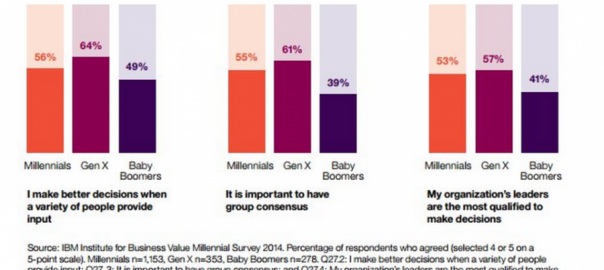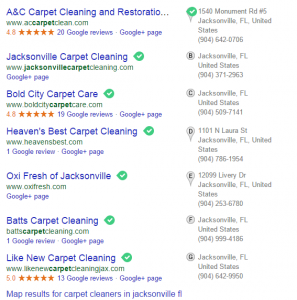Millennials are that mysterious generation between the ages of 18 and 35, born after 1980, who have been given a reputation that says they have an inborn distrust of hierarchy and bureaucracy, and are prone to job-hopping. They want a secure job, but they aren’t looking to make one job their life’s work. They are on track to being the most educated generation, rising to meet a new knowledge-based economy.
But is this reputation actually true? To manage your Millennial employees, you must understand the group and how they compare to other generations before them.
1. Work In Groups
Millennials have a reputation for “crowdsourcing” and they often do tend to want to work in groups. But don’t let that make you think that they are unable to make decisions on their own. While they value the input of a diverse group, they are still able to make decisions at work without the constant input of others.
In an IBM study of Millennial workers, more than half said they made better business decisions when there was a group of people providing a variety of input. But Generation X response was even higher. So if you are able to work with your Generation X employees, Millennials shouldn’t come as too much of a shock.
Millennials, like Generation X, believe their leaders are the most qualified to make decisions. Baby Boomers seem to have a built-in distrust and skepticism. Perhaps that is why they prefer to avoid group decisions and are unconcerned about getting consensus on their plan of action. They trust themselves to decide.
Key Takeaway: Millennial workers, like Gen X workers, want to have a group consensus when it comes to decision making. As a manager, you need to address this in two seemingly conflicting ways:
- You need to value the importance of the group and instead of “laying down the law” and dictating decisions that affect the whole group, you must involve your team or at least show them why the decision was made. Your team will work better if they feel that the entire group is valued and is in it together.
- You must treat each person as an individual. The group is made up of individuals, not “generational stereotypes.” They may enjoy working and deciding as a group, but we all want to be seen as individuals.
2. Adept At Using Technology
Millennial employees stand out for having skill with technology. Not only are they adept at using technology, but they prefer it. No other generation has grown up steeped in technology like the Millennials have, and so what is seen as optional or gadgetry for older generations is a natural and required for Millennials.
Rather than sticking with what might seem outdated, Millennials will try to inject updated technology and workflows. It will seem more efficient to them even if older employees prefer the “way it’s always been done.”
Oddly, though, Millennials crave in-person collaboration and abhor the faceless vacuum that technology has brought. Sixty percent of Millennials prefer in-person collaboration rather than remote technological solutions.
Not having known how it was before technology, Millennials are beginning to push back against information overload and technology. While older generations embraced telecommuting and the freedom it provided from what they knew of work before, Millennials grew up with telecommuting as the norm. They often crave in-person connections. This explains the rise of nostalgia and interest in old technology such as typewriters and film cameras.
Key Takeaway: Millennial workers are naturally fluent in technology, and will adapt and adopt it into your workflow quickly. As a manager, you must understand that:
- Technology isn’t novel. It’s always been there. And just as older generations leapt for new technology because it was something they were not used to, Millennials may crave a sans-technology approach in communication. Remember, people and connections are important to them.
- Not all technological changes suggested by Millennials will be valuable. They may cause problems for the team. Mixing Millennials and older generations will likely be a cause for compromise when it comes to technology, and truly evaluating which tools can improve efficiency and which ones will be an unnecessary roadblock for your other workers is important.
3. Desire Regular Feedback
Millenials have a different “social mindset,” according to the Ivey Business Journal. We’ve talked a bit about that in the previous points, but another aspect of that mindset is that they want feedback on how they are doing, they want that feedback often, and they want it right now.
This level of feedback meets their need to always be learning and growing, but there is another reason why they desire more frequent (and sometimes instant project-based feedback): they grew up with the internet and social media, and are more familiar with instant gratification and instant feedback than previous generations. Previous generations have the mindset of getting the job done, while Millennials require much more praise to encourage them to continue. Their generation grew up with high expectations and, along with that, near constant praise and affirmation at each stage.
While twice-yearly reviews might be enough for your other workers, it is in this category that Millennials stand out and show how different they are. Some Millennials may take the lack of reviews and feedback to mean that they are not appreciated.
Key Takeaway: Not all of your team will want the same kind of feedback that Millennials prefer. Provide your team the feedback they need on an individual level. You can still have twice-a-year reviews, but may need to provide informal feedback between that for some.
Dr. Joanne G. Sujansky, CSP and Jan Ferri-Reed, Ph.D suggest that you may also need to change how you approach negative feedback when dealing with Millennials, couching it first in a positive affirmation before addressing an issue that needs to be changed. Additionally, you may want to create mentorship programs so Millennials have direct access to near constant feedback and feel they are valued.
4. They Are Motivated Differently
Millennials are motivated by a sense of progress, the opportunity to be creative, and a sense that what they are doing matters.
While they may eschew, to some degree, traditional hierarchies, you can create mid-level job titles to motivate Millennial workers. Much like the different colored belts in martial arts, instead of the traditional white, brown, and black, these smaller levels show that improvement, though incremental, is happening. It shows your Millennial workers that career progress is taking place.
Millennials have grown up in a “maker-centric” age in which creating something is of utmost important. They are used to having answers and information at their fingertips as well, and a simple online search can provide them with complex answers to just about any question. The speed at which they can find answers feeds into their need to be creative. Remember, they grew up in a fast-paced information age, and their attention span might be shorter (though it might also explain their adeptness at multitasking).
You can also help your Millennial workers by explaining the vision of your business. This is not a generation just happy to punch a timecard and work for a few hours. They want to know that their work matters in the scheme of things, that they are a part of something larger. By explaining and illustrating the vision for your business, you help them understand how they fit into that plan other than just punching in and clocking hours.
Key Takeaway: Millennials are motivated by the prospect of creativity, change, and social connections rather than typical motivations of high salaries and moving up the ladder. They want to feel fulfilled in their work. This provides a few challenges for managers, with one key issue being that Millennials may feel frustrated if their ideas don’t seem to go anywhere, or take too long to be acted on.
They do not have the patience for typical business hierarchies, instead associating the speed at which they can research and solve problems as the same speed in which change should occur. While you cannot (and should not) always accommodate that fast pace, put into place a mechanism where new ideas that the group deems valuable do have an opportunity to go forward quickly. Their creativity and the implementation of ideas feeds the sense that they have value and are doing something that matters in your company.
5. Give Back To The Community
Millennials are concerned about giving back to the community. A 2010 study by Pew Research Center found that Millennials were more concerned with helping people in need than they were with getting a high salary.
If you hope to attract and inspire millennials, you must offer them more than the chance to earn a buck. You need to show that them their work matters in the scheme of something larger than themselves. One way to do this is to create programs and opportunities for them to give back to the community. This might be through time off to participate in charity events, through company-sponsored events, or through a matched donation plan to the organization of their choice.
Key Takeaway: Millennials want to feel that they are doing something to help others. They want to work for a company that has a reputation for caring about people and important causes, or at the very least allows them to be active in supporting those causes themselves.
6. Offer Flexibility
Millennials prefer more flexibility in how they do their job as well as time (and acceptance) to pursue their own personal projects. This doesn’t simply translate into a 9-5 job that they can do at home; they still prefer that in-person communication. Instead, it means taking a new look at how a work day is composed.
A Griffith Insurance Education Foundation report on Millennial researhc from 2011 found that Millennial workers will sacrifice pay if it means that they have a better work and life balance. What this means is that Millennials expect to have the option to adjust their work schedule to fit their life rather than the other way around. They prefer more vacation time (unlimited, if they can get it) and the ability to work outside of the office.
Key Takeaway: With Millennial workers, their lives aren’t reshaped to fit the job. It’s the other way around. While not every job and position can accommodate this level of flexibility, find ways to give them that work and life balance so that they do not feel their personal lives are sacrificed for the betterment of your company. For example:
- Encourage them to pursue outside projects and interests to prevent burnout and negative feelings direct towards their position in your company.
- Let them design their own work hours at the office by setting up a block of time when you want everyone there but letting each worker determine how early they will come in and how late they will stay on either side of that block of time.
- Create seasonal hours in the summer where each employee has a four-day work week, some with Mondays off, some with Fridays. Or, let them create a four-day work week by working a longer day to make up for the extra day.
—
The truth is that Millennials are not all that different from previous generations in the most important aspects of work, including ethics, habits, and teamwork. They sometimes get a bad reputation for being lazy or self-centered, but that is not the case. That IBM study reveals something remarkable: Millennials aren’t all that different from previous generations, and are quite similar to Generation X. In fact, if there was a generation that stood out as taking an unusual approach to work, it would be…Baby Boomers.
Ultimately, Millennials want to feel that their work and their place in your business has meaning. Lynne Lancaster, co-author of When Generations Collide, says it best: “They want access to bosses, to be mentored and coached, and for bosses to show an interest. When they get ignored, they start to ask “Why am I here?’”
This post originally appeared on the When I Work blog. You can view it here.
(301)








